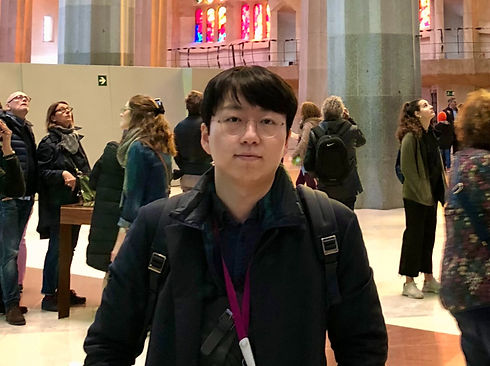

정현철 (Hyunchul Jung), Ph.D.
선임연구원 (Senior Researcher)
CO2 & Energy Research Center
Chemical Process Research Division
Korea Research Institute of Chemical Technology
Phone:
+82-(0)42-860-7554
Email:
Research Area:
Liquid Organic Hydrogen Carrier, Carbon Capture,
Chemical Process Engineering, Electrification
Research Overview

Liquid Organic Hydrogen Carrier (LOHC)
LOHC technology enables safe and efficient storage and transportation of hydrogen by using organic compounds that exist in the liquid phase under ambient temperature and pressure. This research focuses on enhancing the efficiency and economic feasibility of LOHC systems through catalyst development for hydrogenation/dehydrogenation reactions, reactor design, and process optimization. These efforts are directed toward contributing to the establishment of renewable energy–based hydrogen supply chains and achieving carbon neutrality across industries.

CO₂ Adsorbents and Systems
for Direct Air Capture
DAC is a technology that directly captures low-concentration CO₂ from the atmosphere. To minimize CO₂ capture costs, the primary research objective is to develop integrated technologies that link high-performance, high-stability adsorbents with optimized system designs. This includes the synthesis and evaluation of amine-based and advanced-material adsorbents, while exploring process configurations that are holistically integrated and optimized. In particular, the electrification of processes and adsorbents is being investigated as a promising approach to leverage renewable energy and reduce capture costs.

Next-Generation
Chemical Processes Based on Process Scale-Up and AI Utilization
Translating laboratory-scale technologies to an industrial scale involves more than simply increasing equipment size; it requires sophisticated design expertise that unites all aspects of reaction, transport, and control into a cohesive system. This research combines process simulation with data-driven analysis to identify optimal designs and operating conditions, while incorporating AI-based prediction and control techniques to simultaneously improve process efficiency and reliability. This approach seeks to realize sustainable chemical processes that go beyond the limitations of conventional methods.
Other Research: Lactic Acid to PLA Process Scale-Up
Lactic Acid to PLA Process Scale-Up: To commercialize the eco-friendly bioplastic PLA, I have worked on the design, optimization, and pilot-scale operation of processes for producing PLA from lactic acid. This includes process evaluation and scale-up strategy development across all stages, from reaction to separation and purification.
Professional Experience
2024 - Present
Senior Researcher, CO2 & Energy Research Center, Chemical Process Research Division, KRICT
2018 - 2024
Senior Research Scientist, Petrochemicals R&D, LG Chem
2017 - 2018
Postdoctoral Researcher, CO2 Energy Vector Research Center, Carbon Resource Institute, KRICT
2016 - 2016
Research Professor, Department of Chemical and Biological Engineering, Korea University, Seoul, Korea
Principal investigator: Prof. Sung Hyun Kim
Education
2011 - 2016
Ph.D., Department of Chemical and Biological Engineering, Korea University, Seoul, Korea
Advisor: Prof. Sung Hyun Kim
Dissertation: Preparation and Characterization of Novel Amine-Based Solid Sorbents for Carbon Dioxide Adsorption
2007 - 2011
B.S., Department of Chemical and Biological Engineering, Korea University, Seoul, Korea
Advisor: Prof. Dae Ryook Yang
Selected Publications
-
S. Jeon , H. Jung , S.H. Kim, K.B. Lee, Double-Layer Structured CO2 Adsorbent Functionalized with Modified Polyethyleneimine for High Physical and Chemical Stability, ACS Applied Materials & Interfaces 10(25) (2018).
-
H. Jung, S. Jeon, D.H. Jo, J. Huh, S.H. Kim, Effect of crosslinking on the CO2 adsorption of polyethyleneimine-impregnated sorbents, Chemical Engineering Journal 307 (2017).
†
†
Biography
Hyunchul Jung is a chemical engineer specializing in carbon capture materials, chemical process design, and eco-friendly chemical technologies.
He received both his B.S. (2011) and Ph.D. (2016) in Chemical and Biological Engineering from Korea University under the supervision of Prof. Sung Hyun Kim. His doctoral research focused on developing novel amine-based solid sorbents for low-temperature CO₂ adsorption.
After briefly serving as a Research Professor at Korea University in 2016, Dr. Jung joined the Korea Research Institute of Chemical Technology (KRICT) as a Postdoctoral Researcher from 2017 to 2018. At KRICT, he conducted research on carbon resource technologies, including plasma-assisted SF₆ decomposition and CO₂-utilization for refrigeration cycles, integrating material research with process design.
From 2018 to 2024, Dr. Jung was a Senior Research Scientist at LG Chem’s Petrochemicals R&D Center. His primary responsibilities included participation in projects such as the lactic acid-to-PLA production process and the development of processes for adiponitrile (ADN) and hexamethylenediamine (HMDA), emphasizing process feasibility, economic evaluation, and technical assessments.
In 2024, Dr. Jung returned to KRICT as a Senior Researcher in the CO₂ & Energy Research Center within the Chemical Process Research Division. He is interested in developing scalable liquid organic hydrogen carrier (LOHC) systems for renewable hydrogen storage, electrified chemical processes, and CO₂ capture and conversion technologies.
Dr. Jung is committed to advancing sustainable chemical engineering solutions that address global environmental challenges.



